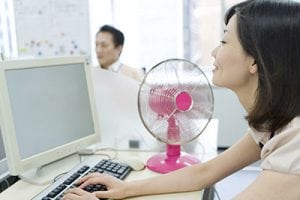At this point in time in the United States, there are a record breaking number of elderly females over the age of 50 that are in the workplace. For those going through menopause however, the workplace can be anything but comfortable when dealing with hot flashes and other menopausal symptoms. Key factors for having a comfortable work environment during menopause include good ventilation, proper fitting and moisture-wicking uniforms, comfortable seating options, access to time off when necessary, and proper hydration and cooling options such as fans or air conditioning. Any of the above remedies can assist women experiencing hot flashes, difficulty concentrating and the imbalance of their hormones that comes with menopause.
Menopause and Career
This phase of life will happen to all aging woman at some point in time, and many are finding that it can cause turmoil in their lives and especially in their work or career environment.
Aside from the well-known hot flashes and sweats, menopause can also lead to anxiety or mood swings which can provide an unnecessary burden when it comes to important deadlines or completing certain mental tasks and dealing with tough employers, coworkers or customers. While menopause and working a full-time job are common occurrences that everyone is familiar with, working during menopause can add a variety of challenges. Understanding the struggles that arise for aging women in the workplace is something to consider, in order to best prepare for the challenge.
While some women may even feel apprehensive or worried about dealing with menopause at the height of their careers, it is essential to know that they are not alone, every aging woman goes through this and speaking up about the subject can help fellow women in the workforce better handle their own struggles. The start of this process can be abrupt for some females and it is crucial to be compassionate with yourself and others, especially during the stressful moments. Having a career can magnify negative emotions and lead to feelings of helplessness or overwhelm. Taking care of yourself mentally and physically can be of tremendous benefit when going through this inevitable hormone change.
How to Prevent Menopause from Killing Your Career

To ensure that your career does not suffer while dealing with menopause, there are a few things you can do to make the transition easier. Medication can be a substantial benefit, but if you would like to go the more natural route, there are plant-based phytoestrogens and supplemental formulas that actually mimic the body’s hormones. Chia seeds, flax seeds and soybeans all contain similar chemicals to endogenous estrogens and can aid in managing symptoms in menopausal woman.
Introducing more vitamin D and calcium with foods such as cheese, spinach, milk, kale and yogurt can decrease the risk of developing conditions such as osteoporosis. Getting adequate sun exposure is another method of boosting vitamin D levels in the body, and foods like eggs and fish can be supplemented too. Steering clear of unhealthy amounts of alcohol, caffeine and sugar can be difficult with a stressful career, but it is essential that menopausal woman keep these to a minimum for symptoms to be kept at bay.
While healthy habits and some modifications may be necessary for managing menopausal symptoms in the workplace, if you are still experiencing high levels of stress or depression after these alternatives, it may be time to speak with your healthcare professional for other options.





